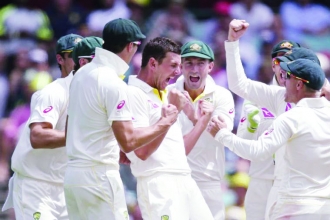High risks of missing out on substantial IPL money and injury doesn’t stop top cricketers to give their best in Test cricket while representing their country.
The recently concluded Australia-South Africa Test series was, even if you leave out the hopelessly one-sided fourth Test, not only one of the most controversial in recent memory but also one of the most competitive. A strong and robust South African team at home were taking on an Australian side blessed with their innate never-say-die approach and it sure made for some enthralling cricket.
The high standards maintained by both sides, at least for the first three games, definitely offered a polite reminder to those who believe Test cricket is dying. It’s very much alive and the sheer competitiveness on display was a fair enough reflection of that.
This Australia-South Africa series was being played a year after another enthralling four-Test series closer to home between India and Australia. Despite the Aussies battling gallantly, the Indians at home proved to be far too strong after losing the opening Test match.
It isn’t just the competitive spirit that binds both these series together, there is another common factor. As many as three players Kagiso Rabada, Patrick Cummins and Mitchell Starc, all fast bowlers, were ruled out through injury from the ongoing Indian Premier League (IPL) that started a few days post the completion of the Australia-South Africa series. This is in addition to Steve Smith and David Warner who are not playing this season’s IPL after being handed a one-year ban by Cricket Australia, for their role in the ball-tampering scandal that took place during the third Test match in Cape Town.
This is not the first time though that we are seeing players putting their bodies on the line to play Test cricket even if it means aggravating an injury that could rule them out of the cash-rich IPL. Last year saw three premier Indian cricketers KL Rahul, Ravichandran Ashwin and Murali Vijay miss the entire IPL season, a rare occurrence in the tournament’s decade-long history as Indian players are always the major draw.
More than just the physical toll that such heavy schedules involving Test cricket can take on one’s body is also the mental side of things. Starc and Cummins were both involved in the Ashes, a special series for any Australian cricketer, a couple of months prior to their duel against South Africa. Rabada, on the other hand, was involved in a highly competitive series against India right through January.
With such lucrative contracts on offer, the players could easily have tried to preserve their bodies for the IPL. Starc was bought by Kolkata Knight Riders for Rs 9.4 crore, one of the highest for an overseas player. Cummins too was on a handsome contract of Rs 5.4 crore with the Mumbai Indians and Rabada was bought for Rs 4.2 crore by Delhi Daredevils.
Yet with so much riding on their performances, and the series attracting interest even from outside their own countries, it would have been silly to imagine these cricketers saving themselves. Given their workloads and also the fact that they are fast bowlers, it was only inevitable that something had to give.
It was effectively a repeat of last year when the three Indians, who had played non-stop from September, had to pull out through injury from the IPL. In one of the cases, Murali Vijay had played the Test series against Australia with a wrist injury, probably in the knowledge that the IPL would have to be sacrificed as a result.
While injuries to anyone, let alone sportspeople are terribly unfortunate, for a format that many believe is losing out to the riches of Twenty20, it is heartening to see many top cricketers giving their all and keeping the value of Test cricket alive. The problem does arise of course in the scenario where some of the world’s best Test cricketers are also premier Twenty20 cricketers.
The best example of this is the great AB de Villiers or even Virat Kohli, but even amongst the names mentioned above, Mitchell Starc is a quality T20 bowler while KL Rahul has shown the ability to combine the different needs and requirements of being a good Test cricketer and a top-drawer T20 player, one of the reasons why he attracted a bid of Rs 11 crores at the recent IPL auction.
Despite some well-contested series’ in the recent past, is it fair to say that Test cricket isn’t really in the pink of health? Well the trend hasn’t hit Indian shores as yet, but England, Australia and New Zealand are all seeing the rise of players who are giving up their first-class careers so as to focus on 50-over and T20 cricket.
In the West Indies, many of their premier cricketers do not play Test cricket and were recently left out of the squad that played the 2019 ODI World Cup qualifiers, and instead played in Pakistan’s Twenty20 competition. It’s an unfortunate scenario but perhaps the reality of today’s cricket world has to be embraced. One does genuinely hope that the balancing act between Test cricket and cash-rich Twenty20 leagues can be found.
(The writer is a sports management professional)
Writer: Shakya Mitra
Courtesy: The Pioneer








 OpinionExpress.In
OpinionExpress.In















Comments (0)